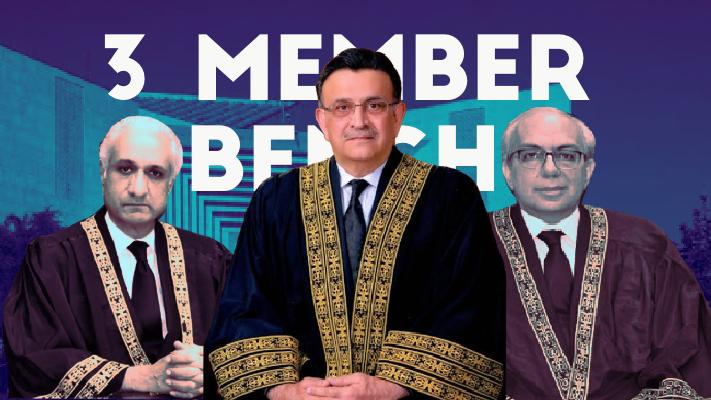The Supreme Court on Wednesday warned the government of “serious consequences” if it failed to release the funds for holding elections to the provincial assemblies of both Punjab and Khyber Pakhtunkhwa.
The apex court gave the warning while rejecting the defence ministry’s plea to conduct general election in the country simultaneously once the national and other provincial assemblies completed its constitutional terms.
The petition was heard by a three-judge bench headed by Chief Justice of Pakistan (CJP) Umar Ata Bandial and comprised of other two judges including Justice Ijazul Ahsan and Justice Munib Akhtar.
The defence ministry’s petition was filed a day earlier which requested the apex court to recall its April 4 order that had fixed May 14 as the election date for the Punjab Assembly.
The defence ministry also filed a report in court in line with h its directives to the State Bank of Pakistan (SBP) and other departments for submitting reports after release of Rs21 billion to the ECP for holding elections to the Punjab and KP assemblies.
The ministry in a report cited heightened security situation in the country which warranted holding of election simultaneously across the country.
“Due to the prevalent security situation and counter-terrorism operations being carried out in KP and Balochistan as well as the intelligence-based operations in Punjab and Sindh, the armed forces, Rangers, Frontier Constabulary and other forces are not logistically available to be repositioned and re-posted for providing election security, twice in a span of six months,” the report said.
“Significant time is required to prepare the members of the armed forces for the election duty, given much of the force has been actively engaged in operations for a considerable period of time,” the application said, adding the security situation in Punjab and Sindh has been stable in the light of the efforts of the ongoing operations in KP and Balochistan, respectively.
Therefore, any diversion of troops from KP and Balochistan will result in directly affecting the security situation in Punjab and Sindh, the application explained.
The court order said the plea could not be entertained or relief granted since the matter was already decided by a final judgement of the court and was thus “disposed of as not maintainable”.
Regarding the compliance report from the Finance Division on providing the funds for the polls, the order reiterated the proceedings pertaining to it in the cabinet and National Assembly, adding that the division said the funds could not be made available to the election commission since the NA had rejected the motion.
The order noted that it was “specifically queried” from the Finance Division and confirmed by it that Article 84 of the Constitution allowed the federal government to make expenditures from the Federal Consolidated Fund.
It added that the federal government obtained ex post facto authorisation from the NA in the form of a supplementary budget statement for this and the normal practice was for the statement to be laid before the NA.
The order said that there could be therefore no doubt that the federal cabinet “all along itself had the authority and power to authorise the expenditure of Rs21 billion” for election expenses. It further said that the AGP had not attempted to “seriously dispute” this position.
“To the extent therefore that the report of the Finance Division concludes, or proceeds on the basis that, the federal government did not itself have the requisite constitutional authority and power at all times to authorise the expenditure of Rs21bn for the general elections, it cannot be accepted,” the order reads.
Addressing the cabinet’s decision to refer the release of funds to the NA, the order said: “In terms of the system of parliamentary democracy envisaged by the Constitution, the government of the day must command the confidence of the majority of the NA at all times.”
It added that since the office of the prime minister had primacy, the premier “must enjoy the confidence of the majority of the NA at all times.”
“It follows from the foregoing (and this is an important constitutional convention) that the government of the day must be able to secure the passage of all financial measures that it submits before the NA. This would be certainly true for a financial measure of constitutional importance.”
The order said that when viewed from this perspective, the NA’s rejection of the demand to release poll funds held “serious constitutional implications”.
“One possibility is that the government (and also, since the federal cabinet is appointed on the advice of, and is headed by, him, the prime minister) have lost the confidence of the majority of the members of the NA. The learned attorney general categorically stated that this was not so. The federal cabinet and the prime minister have, and had, at all times the confidence of the majority of the NA. For present purposes, we accept this statement made by the learned attorney general.
“The other possibility then is that the putative rejection … is to be regarded as anomalous, and the resulting situation can be rapidly rectified. The learned attorney general fully appreciated the serious constitutional consequences that would flow, were the first possibility to reflect the correct position.
“Furthermore, any future to and fro of this matter between the executive and legislative branches would not advance or serve any constitutional purpose. There would be a serious breach of constitutional duty and obligation. It is also to be emphasised that the orders of this court seek only to enforce and effectuate binding constitutional obligations. A disobedience and defiance of the orders of the court can itself have serious consequences.
“The learned attorney general was therefore directed to draw the attention of the federal Cabinet and the prime minister to the foregoing so that the matter is remedied at the earliest. The court requires that appropriate remedial measures be taken in full measure not later than April 27, 2023, and, in particular, by that date the sum of Rs21bn be provided, in immediately available and realisable funds, to the commission for the holding of the general elections to the Punjab and KP assemblies,” the order reads.
The order also rejected a plea from the election commission for the poll date to be restored to Oct 8 as being non-maintainable, saying that it was impermissible to attempt to reopen issues and questions that were already decided.
The apex court had ordered the government to provide Rs21bn to the ECP to conduct elections in Punjab and Khyber Pakhtunkhwa by April 10, and directed the ECP to provide a report on whether or not the government complied with the order on April 11.
The issue for release of funds, however, was referred to the Parliament which rejected the bill for the purpose.
The ECP also informed the court about non-provision of the funds for the elections from the Federal Government.
The apex court then ordered the central bank to release funds worth Rs21bn for elections from from Account No I — a principal component of the Federal Consolidated Fund worth Rs1.39 trillion — and send an “appropriate communication” to this effect to the finance ministry by April 17.
The SBP, while following the orders, allocated the funds and sought the finance ministry’s approval for release of the amount.
An approval of government is required to release the amount from the FCF while the government has to get the National Assembly’s approval for its release.
But the same day, the coalition government managed through the NA the rejection of its own demand for provision of Rs21bn as a supplementary grant to the ECP for holding polls in the two provinces.
Speaker Raja Pervaiz Ashraf put the motion before the house for a voice vote after it was moved by Law Minister Azam Nazeer Tarar on behalf of Finance Minister Ishaq Dar through a supplementary agenda.



